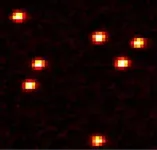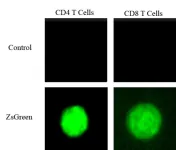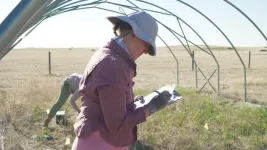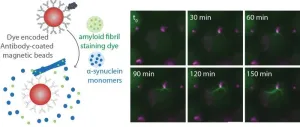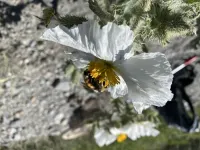(Press-News.org) UNIVERSITY PARK, Pa. — Mobile phones pack a lot of information into pocket-sized devices, which is why users may want to slow down the next time they’re scrolling through social media or checking email on a mobile app. People process information more efficiently but tend to be less vigilant about misinformation on their mobile phones compared to personal computers (PCs), according to a team led by Penn State researchers. This is especially true for users who have developed a routine or habit of using their mobile phones.
The research team also found that, counterintuitively, PC users are more likely to click on malicious links in phishing e-mails. The findings, published in the journal New Media & Society, have implications for cybersecurity and point to a need for additional alerts on mobile devices to combat misinformation and warnings on personal computers to combat susceptibility to phishing attempts.
“A good number of people report that they habitually use a mobile phone for everything from entertainment to work, and it serves them well, but habitual mobile phone usage leads them to let their guard down,” said principal investigator S. Shyam Sundar, the James P. Jimirro Professor of Media Effects at Penn State. “It’s important for them to recognize this behavior and to minimize their habitual use or their consumption of news on mobile devices, and for developers to create an alert system to remind them not to believe everything they read.”
To better understand how device type affects information processing, the team conducted two field experiments. Participants self-reported their habitual mobile phone usage and completed surveys using their own mobile phones and personal computers outside a laboratory setting, with all the push notifications and distractions that come with those devices and environments, giving the research team a better sense of how individuals use their devices and comprehend information in real-world settings.
“Usually when we conduct studies, we try to control as many extraneous factors as possible, but in this case, we ran field experiments because we wanted to test the differences in information processing between the two different devices in a natural way, by including all the noise and distractions that people encounter in their daily usage,” said Mengqi Liao, first author and doctoral candidate in mass communication at Penn State.
In the first study, the researchers asked 116 participants from Amazon Mechanical Turk to use their mobile phone or PC, including both desktop and laptop computers, to review normal emails, tricky pictures such as a copper-colored stainless-steel knife, and spam emails. The researchers recorded how much time participants spent reviewing the information. They also asked the participants questions to measure variables such as their recall of details from the emails and pictures, such as what material the copper-colored knife was made of and how likely they would be to act on the information in the emails.
In the second study, the researchers asked 241 university students to use their mobile phone or PC to review misinformation in news blurbs and phishing emails. The researchers again recorded the time participants spent reviewing the material and if participants clicked on the malicious links in the phishing emails, though the links took them to a post-questionnaire instead of an actual malicious website. The researchers also asked participants questions to gauge how they processed and interacted with the material and to indicate if they ever felt suspicious towards the deceptive content.
“In our first study, we did not find many differences across the two devices in terms of information processing other than the fact that mobile users processed information faster,” Liao said. “In the second study we focused more on deceptive content and recorded actual behavioral measures, like whether participants clicked on a malicious link. This is where we are more likely to observe detrimental effects from people processing information in a shallow manner, because with deceptive content, the consequences of people letting their guard down and being less skeptical towards misinformation can be quite dangerous.”
The way people have come to associate certain devices with specific types of content, such as processing news on mobile devices and emails on computers, may have driven the results, said Sundar.
“The stance in mobile seems to be that if you have to do more work, like go from one app to another to another, you’re less likely to pursue information further, whereas with email on a PC, you’re in work mode and may want to explore in depth,” he said. “That is perhaps why mobile users are quick to share misinformation without bothering to first verify information, and PC users are prone to click on links that they shouldn’t be clicking.”
Pop-up alerts are important for warning mobile users about potential misinformation and PC users about malicious links, he added.
Device-specific responses may also account for the counterintuitive finding that PC users are more likely to click on malicious links, according to the researchers. It seems more convenient or easier to click on links on a PC, which open in a new browser tab but give the appearance of opening on the same screen, than on mobile devices, where the user has to switch between apps, Liao said. PC users may also rely more on their antivirus software, letting their guard down when they see links in phishing emails, she added.
“It’s becoming more urgent, with all the misinformation on the internet, that we communicate these risks to users,” Liao said. “On the PC side, don’t click a new link just because it’s convenient, as it can lead to dangerous outcomes. And given that mobile phones can make you less vigilant, maybe slow down a bit and be more careful when processing information on these devices.”
Jinping Wang, University of Florida, and Cheng Chen, Elon University, also contributed to the work.
END
Slow the scroll: Users less vigilant about misinformation on mobile phones
Habitual mobile phone users engage in less information processing, more likely to fall for misinformation on their mobile phones than on personal computers, researchers find
2024-01-08
ELSE PRESS RELEASES FROM THIS DATE:
Researchers at UMass Amherst shed light on how tumor cells outwit the body’s immune system
2024-01-08
AMHERST, Mass. – In a first-of-its-kind research breakthrough, a team of scientists at the University of Massachusetts Amherst has analyzed and described what they call the “mosquito effect,” which sheds light on how certain pathogens, such as cancerous tumor cells, can outwit the body’s immune system.
Just as mosquitoes ingest their host’s blood, the immune system’s T cells incorporate cytoplasmic material from tumors into their own cytoplasm. While it has long been known that many kinds of cells can transfer cellular material from one to another, the transfer of the cytoplasm has never been observed in T cells. Subsequent single-cell RNA (scRNA) ...
New soft robots roll like tires, spin like tops and orbit like moons
2024-01-08
Researchers have developed a new soft robot design that engages in three simultaneous behaviors: rolling forward, spinning like a record,and following a path that orbits around a central point. The device, which operates without human or computer control, holds promise for developing soft robotic devices that can be used to navigate and map unknown environments.
The new soft robots are called twisted ringbots. They are made of ribbon-like liquid crystal elastomers that are twisted – like a rotini ...
Bottled water can contain hundreds of thousands of previously uncounted tiny plastic bits, study finds
2024-01-08
In recent years, there has been rising concern that tiny particles known as microplastics are showing up basically everywhere on Earth, from polar ice to soil, drinking water and food. Formed when plastics break down into progressively smaller bits, these particles are being consumed by humans and other creatures, with unknown potential health and ecosystem effects. One big focus of research: bottled water, which has been shown to contain tens of thousands of identifiable fragments in each container.
Now, using newly refined technology, researchers have entered a whole ...
EMBARGOED UNTIL JAN. 8 @ 3 PM EST: UTHealth Houston study: EBV-specific T-cells play key role in development of multiple sclerosis
2024-01-08
The body’s immune response to Epstein-Barr virus (EBV) may play a role in causing damage in people with multiple sclerosis, according to a new study led by UTHealth Houston.
EBV infection has long been associated with multiple sclerosis, but how the infection might contribute to multiple sclerosis has not been clear. More than 95% of people have been infected with this very common virus; however, it typically remains in its latent stage and doesn’t cause any issues. In some cases, though, the T-cells specific for the EBV infection may cause ...
Colorado State researcher leads global study of extreme drought impacts on grasslands and shrublands
2024-01-08
EMBARGO: THIS CONTENT IS UNDER EMBARGO UNTIL 3 P.M. U.S. EASTERN STANDARD TIME ON JANUARY 8. INTERESTED MEDIA MAY RECIVE A PREVIEW COPY OF THE JOURNAL ARTICLE IN ADVANCE OF THAT DATE OR CONDUCT INTERVIEWS, BUT THE INFORMATION MAY NOT BE PUBLISHED, BROADCAST, OR POSTED ONLINE UNTIL AFTER THE RELEASE WINDOW.
A global study organized and led by Colorado State University scientists shows that the effects of extreme drought – which is expected to increase in frequency with climate change – has been greatly underestimated for grasslands and shrublands.
The findings – published in Proceedings of the National Academy of Sciences – quantify the impact of extreme ...
McMaster researchers discover molecular ‘barcode’ used by bacteria to secrete toxins
2024-01-08
Researchers at McMaster University have discovered a molecular “barcode” system used by disease-causing bacteria to distinguish between beneficial and toxic molecules.
Published in the Proceedings of the National Academy of Sciences (PNAS), the new study shows that many bacteria can figuratively scan genetic codes to learn which proteins to keep and which proteins to expel into the environment.
According to researchers, those proteins that are expelled are often toxic to human cells, making the ...
Migrants can be ‘transformative force’ for sustainable development
2024-01-08
Well-managed migration can enable migrants to boost sustainable development, research shows.
Sustainable development means enhancing wellbeing in ways that equitably meet needs of present and future generations.
Migration is often viewed as a threat to this – and to stability and security – while the benefits for migrants and host nations and regions are overlooked.
The new research – a set of studies published in the journal Proceedings of the National Academy of Sciences – shows new policies are needed for managing migration to maximise sustainability, and to minimise involuntary displacement due to conflict or disasters.
The ...
Novel test holds promise for detecting Parkinson’s disease early
2024-01-08
Novel Test Holds Promise for Detecting Parkinson’s Disease Early
Investigators from Brigham and Women’s Hospital and the Wyss Institute are working together to develop a new approach to detect and quantify minute amounts of a biomarker of Parkinson’s disease and related disorders at early stages
The platform has the potential to create early applicable molecular diagnostics, improve clinical trials, and facilitate drug screening
(Boston) — In the development of Parkinson’s ...
Protecting coral ‘nurseries’ as important as safeguarding established coral reefs
2024-01-08
When imagining corals, the picture that comes to mind is usually a stationary one: a garden of rock-like structures covering sections of the ocean floor. Reef conservation efforts typically focus on preserving established coral and protecting them from known stressors such as pollution, overfishing and runoff from coastline populations.
However, new research near Miloliʻi in the southwestern part of Hawai’i Island shows that identifying and protecting marine ecosystems, both down-current and up-current of coral reefs, specifically areas where coral larvae are more likely to survive and thrive, is crucial to future coral conservation and restoration efforts—especially ...
Nutrition needs drive bee appetites
2024-01-08
FORT COLLINS, Colo., Jan. 8, 2024 — What’s all the buzz about? Most garden enthusiasts know that certain flowers can attract pollinators. New research helps explain why, and also provides more details about how the nutrition found in plant pollen may determine which specific bee communities might favor your garden. On a larger scale, this research may help fight against pollinator declines through better design of rangeland restoration projects.
Scientists at the USDA Forest Service’s ...
LAST 30 PRESS RELEASES:
ASU researchers to lead AAAS panel on water insecurity in the United States
ASU professor Anne Stone to present at AAAS Conference in Phoenix on ancient origins of modern disease
Proposals for exploring viruses and skin as the next experimental quantum frontiers share US$30,000 science award
ASU researchers showcase scalable tech solutions for older adults living alone with cognitive decline at AAAS 2026
Scientists identify smooth regional trends in fruit fly survival strategies
Antipathy toward snakes? Your parents likely talked you into that at an early age
Sylvester Cancer Tip Sheet for Feb. 2026
Online exposure to medical misinformation concentrated among older adults
Telehealth improves access to genetic services for adult survivors of childhood cancers
Outdated mortality benchmarks risk missing early signs of famine and delay recognizing mass starvation
Newly discovered bacterium converts carbon dioxide into chemicals using electricity
Flipping and reversing mini-proteins could improve disease treatment
Scientists reveal major hidden source of atmospheric nitrogen pollution in fragile lake basin
Biochar emerges as a powerful tool for soil carbon neutrality and climate mitigation
Tiny cell messengers show big promise for safer protein and gene delivery
AMS releases statement regarding the decision to rescind EPA’s 2009 Endangerment Finding
Parents’ alcohol and drug use influences their children’s consumption, research shows
Modular assembly of chiral nitrogen-bridged rings achieved by palladium-catalyzed diastereoselective and enantioselective cascade cyclization reactions
Promoting civic engagement
AMS Science Preview: Hurricane slowdown, school snow days
Deforestation in the Amazon raises the surface temperature by 3 °C during the dry season
Model more accurately maps the impact of frost on corn crops
How did humans develop sharp vision? Lab-grown retinas show likely answer
Sour grapes? Taste, experience of sour foods depends on individual consumer
At AAAS, professor Krystal Tsosie argues the future of science must be Indigenous-led
From the lab to the living room: Decoding Parkinson’s patients movements in the real world
Research advances in porous materials, as highlighted in the 2025 Nobel Prize in Chemistry
Sally C. Morton, executive vice president of ASU Knowledge Enterprise, presents a bold and practical framework for moving research from discovery to real-world impact
Biochemical parameters in patients with diabetic nephropathy versus individuals with diabetes alone, non-diabetic nephropathy, and healthy controls
Muscular strength and mortality in women ages 63 to 99
[Press-News.org] Slow the scroll: Users less vigilant about misinformation on mobile phonesHabitual mobile phone users engage in less information processing, more likely to fall for misinformation on their mobile phones than on personal computers, researchers find


